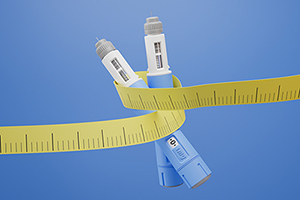



Q: I am a type 2 diabetic who takes 4,000 mg of vitamin C each day. I recently heard that “C” can raise your blood sugar. Is this true?
 A: Vitamin C is an important antioxidant for maintaining optimal health as well as managing infection and disease. It is hard to imagine such an important vitamin could cause adverse effects in anybody.
A: Vitamin C is an important antioxidant for maintaining optimal health as well as managing infection and disease. It is hard to imagine such an important vitamin could cause adverse effects in anybody.
I believe the conundrum of vitamin C raising blood sugar has several sources. A study in 2004 (Am J Clin Nutr 2004;80:1194-200) concluded a high vitamin C intake from supplements (just 300 mg or more) is associated with an increased risk of death from cardiovascular disease (CVD) in older women with diabetes.
I have to take issue with this conclusion because it was extrapolated from the Iowa Women’s Health Study which was designed to examine diet and lifestyle factors and the incidence of cancer and mortality, not vitamin C and its relationship to blood sugar. Fortunately, the authors responsibly note that their study had several limitations, one being there was only one diet and health assessment at the beginning of the study and secondly, the subjects in the study were self-reported diabetics—researchers did not validate this important criteria.
Fueling the conundrum are foods containing vitamin C, such as citrus fruit and juices. They can and will raise blood sugar—especially among diabetics. Fruit intake, let alone juice, has to be kept in check so as not to increase blood sugar. In this setting, high blood sugar is created by the fructose in fruit rather than any vitamin C contained in it.
At the other end of the spectrum are reports that vitamin C in doses of 1,000 mg per day decrease blood sugar and improve Hemoglobin A1c in diabetes, while doses of only 500 mg did not significantly reduce blood sugar or HgbA1c (Indian J Med Res 2007;125(5):471-4). Interestingly, the study on older women with diabetes I cited above concluded supplement doses of 300 mg or higher of vitamin C were associated with CVD. But according to the present study, that amount of vitamin C likely had no impact on their health. We can deduce that high blood sugar is what accelerated their CVD, among other variables such as lifestyle measures.
Other studies have associated low blood levels of vitamin C with higher risks for diabetes (Arch Inter Med 2008;168(14):1493-99). Those with the highest vitamin C levels had the most significant reductions in CVD risk in both women with diabetes and those without.
I remember Dr. Atkins telling me that type 2 diabetes should be classified as a form of cardiovascular disease. This makes sense since those with diabetes progress 70 percent faster to CVD than those without diabetes. High blood sugar “glycates” proteins (read: ages and rusts) that cause damage to blood vessels and oxidize the LDL required to repair them.
If I were you, I would continue taking vitamin C.
To your health!
Though we think of declining estrogen as the hallmark of menopause, it's actually common for…

Up to 12 percent of Americans have ulcers at some point in life. Peptic ulcers…
Gallbladder disease is a modern illness. An estimated 20 million Americans have gallbladder disease. The…

New, more powerful weight loss drugs: Drugs like Wegovy, Rybelsus, Ozempic and Mounjaro/Zepbound are revolutionizing…

According to the Lancet, autoimmune disease affects one in ten people globally and it’s now…

This past week we were regaled with headlines like: High levels of niacin may increase…

Leyla Weighs In: The Erosion of Trust in Nutritional Research

Our virtual voicemail is open 24/7, so there's no need to wait to submit your questions for Dr. Hoffman. Leave a message, and you may hear your question featured on the Intelligent Medicine radio program!